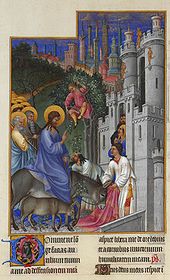Jerusalem rejos for joy

Jerusalem rejos for joy (English Jerusalem rejoice for joy “Rejoice, Jerusalem!” / Latin Illuminare, Jerusalem ) is a carol based on a Middle English poem from the 15th century . The author of the text is unknown. It is contained in the manuscript named after George Bannatyne (1545–1608) (Bannatyne MS f.27v), a literary anthology that was compiled in Scotland in the 16th century .
It is sometimes ascribed to the Scottish poet William Dunbar (around 1460 - around 1520), whose Rorate coeli (Thaws heaven; cf. Isa 45,8 Vul ) it immediately follows.
The phrase 'Illuminare, Jerusalem' comes from the biblical book Isa 60,1 Vul : 'Surge, illuminare, Jerusalem, quia venit lumen tuum, et gloria Domini super te orta est'
A modern setting comes from Judith Weir (born 1954).
text
| English ( A Clerk of Oxford ) |
translation |
|---|---|
|
Jerusalem reioss for joy: |
Jerusalem, rejoice: |
See also
literature
- Bannatyne manuscript, in: John MacQueen; Winifred MacQueen (1972), A Choice of Scottish Verse, 1470-1570, London: Faber and Faber, ISBN 0-571-09532-1 .
- Bannatyne, George; Edited By John MacQueen: Ballattis of Luve: The Scottish Courtly Love Lyric 1400-1570. Edinburgh University Press, Edinburgh, 1970; ISBN 0852241569 / 0-85224-156-9
- (Facsimile) Fox, Denton, and William A. Ringler. The Bannatyne Manuscript: National Library of Scotland Advocates' MS. 1.1.6 London: Scolar Press, in Association with The National Library of Scotland, 1980.
Web links
- The Bannatyne manuscript ( Vol. 2 ) - archive.org
- digital.nls.uk: Bannatyne manuscript
Videos
- Sound samples: a (Judith Weir, Choir of King's College, Cambridge), b (Judith Weir, Church of the Advent Choir)
References and footnotes
- ↑ The Bannatyne manuscript is an important source for Scottish poetry of the fifteenth and sixteenth centuries. The manuscript contains texts of the poems of the great Makars , with many anonymous Scottish plays and works by medieval English poets. ( A transcript of the manuscript, Hunterian Club, 1896, (Volume 2 of 4) - archive.org)
- ↑ Jerusalem rejoice for joy ( Memento of December 19, 2013 in the Internet Archive ) (Center for Digital Discourse and Culture); see. The Poems of William Dunbar with Introductions, Notes and Glossary ( Online ) and archive.org
- ↑ Rorate coeli desuper! heavens, distill your balmy showers (A Clerk of Oxford)
- ↑ Illuminare, Jerusalem on aclerkofoxford.blogspot.com, (A Clerk of Oxford)
- ^ Illuminare, Jerusalem: Jerusalem rejos for joy: carol for SATB and organ. Judith Weir . London, Novello 1986 ( library link ). - It is also included in the Novello Book of Carols edited by William Llewellyn .
- ↑ The composition of this carol was commissioned for the Festival of Nine Lessons and Carols at King's College , Cambridge in 1985. ( kings.cam.ac.uk )
- ↑ German translation using the modernized English version at aclerkofoxford.blogspot.de: Illuminare, Jerusalem (A Clerk of Oxford)